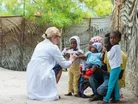Global Health Funding 'Facing Post-Pandemic Challenges'

Global health funding faces challenges amid shifting priorities and economic pressures, according to leading figures from the Institute for Health Metrics and Evaluation (IHME) at the University of Washington.
The 15th annual Financing Global Health Report report was presented recently at the Center for Strategic and International Studies in Washington DC, and highlights the complex landscape of global health financing in the wake of the COVID-19 pandemic.
It was presented by Angela Apeagyei, IHME Research Assistant Professor, and Chris Murray, Professor and Chair of Health Metrics Sciences at the University of Washington.
The report outlines how development assistance for health – which refers to financial and non-financial resources transferred to low- and middle-income countries to improve health – reached $64bn in 2023. This, it says, is a decline from a peak of $84bn during the COVID-19 pandemic but remains 33% higher than pre-pandemic levels in 2019.
The report identifies rising interest rates as a significant concern for global health funding. Low-income countries, it says, face increasing pressure from interest payments, potentially limiting their ability to invest in healthcare.
Progress made on infant mortality rates
Murray emphasised the need to remind stakeholders of the progress made in global health over recent decades, citing the “dramatic reduction in under-five mortality rates” as an example of successful investments.
But he cautioned: “Other global challenges, such as climate change and geopolitical conflicts, are competing for attention and resources, and this shift in priorities could pose risks to continued progress in global health.
The report also suggests advocacy efforts for global health funding should focus on demonstrating the link between health investments and national security.
Apeagyei highlighted the importance of robust health systems in detecting emerging pathogens, sayimng this was “a lesson underscored by the recent pandemic”.
Murray pointed to ongoing innovations in healthcare interventions as a potential source of optimism, noting: “New technologies and approaches could offer more cost-effective solutions to global health challenges.”
The political environment in the US also presents hurdles for maintaining bipartisan support for global health initiatives, the pair say.
US politics 'hampering global health funding'
They cited recent debates surrounding the reauthorisation of PEPFAR (the President's Emergency Plan for AIDS Relief) and changes in the Republican Party that have contributed to a more challenging landscape for global health advocacy.
Murray said: “Focusing on global issues that require coordinated international responses, such as climate change, antimicrobial resistance, and pandemic preparedness, could help rebuild bipartisan support for global health efforts.”
Looking ahead, the IHME is set to release forecasts for global health outcomes through 2050. Despite current challenges, Murray indicated that these projections show continued progress in global health, albeit at a slower pace than in recent decades.
"The headline message is despite all the doom and gloom that we've been talking about, despite capturing the effects of heat - the direct effects of heat, we do expect continued progress just as we've had for the last, you know, 70 years," Murray said.




